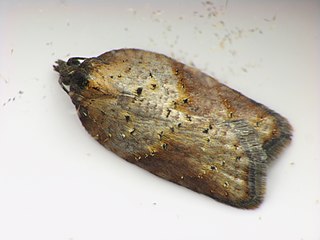
The Tortricidae are a family of moths, commonly known as tortrix moths or leafroller moths, in the order Lepidoptera. This large family has over 11,000 species described, and is the sole member of the superfamily Tortricoidea, although the genus Heliocosma is sometimes placed within this superfamily. Many of these are economically important pests. Olethreutidae is a junior synonym. The typical resting posture is with the wings folded back, producing a rather rounded profile.

The Archipini are a tribe of tortrix moths. Since many genera of these are not yet assigned to tribes, the genus list presented here is provisional.

Chlidanotinae is a subfamily of moths in the family Tortricidae.

The Cochylini are a tribe of tortrix moths. It used to be classified as the subfamily Cochylinae.

Cryptophlebia is a genus of moths belonging to the subfamily Olethreutinae of the family Tortricidae. It occurs in all biogeographical regions except for the Nearctic.
Leguminivora is a genus of moths belonging to the subfamily Olethreutinae of the family Tortricidae.

Glyphidoptera is a genus of moths belonging to the subfamily Tortricinae of the family Tortricidae.

Phalonidia is a genus of moths belonging to the subfamily Tortricinae of the family Tortricidae.
Spatalistis is a genus of moths belonging to the subfamily Tortricinae of the family Tortricidae.
Symphygas is a genus of moths belonging to the subfamily Tortricinae of the family Tortricidae. It contains only one species, Symphygas nephaula, which is found in Australia, where it has been recorded from Tasmania. The habitat consists of subalpine open forests at altitudes between 950 and 1,100 meters.

Cryptophlebia ombrodelta, the litchi fruit moth or macadamia nut borer, is a moth of the family Tortricidae. The species was first described by Oswald Bertram Lower in 1898. It is native to India, Sri Lanka, Nepal, Indonesia, China, Taiwan, Vietnam, Thailand, western Malaysia, New Guinea, the Philippines, Japan, Guam, the Caroline Islands, Australia and has been introduced to Hawaii.

The Euliini are a tribe of tortrix moths.

The Tortricini are a tribe of tortrix moths.

Acropolitis rudisana is a moth of the family Tortricidae. It is widespread in eastern Australia.
Alexey Nikolaievich Diakonoff, also transliterated as Alexej Nikolajewitsch Diakonoff, was a Russian–Dutch entomologist who specialised in Microlepidoptera.
Józef Razowski is a Polish entomologist and lepidopterist specializing in Tortricidae. He is an honorary member of the Polish Entomological Society and a working member of the Polish Academy of Arts and Sciences (PAU). From 1988 to 1997, Razowski headed the Institute of Systematics and Evolution of Animals.
Stictea ejectana, the guava bud moth, is a moth of the family Tortricidae. It was described by Francis Walker in 1863. It is found on Fiji, Samoa, the Marquesas Archipelago, Tahiti, Rapa Iti, the southern Mariana Islands, the Philippines and in New Caledonia, New Zealand and Australia.

Glyphidoptera polymita is a species of moth of the family Tortricidae. It is found in Australia, where it has been recorded from New South Wales.
Marianne Horak is a Swiss-Australian entomologist who specialises in Australian Lepidoptera, particularly the phycitine and tortricid moths, and is considered one of the worldwide leading experts on the systematics of Tortricidae.













